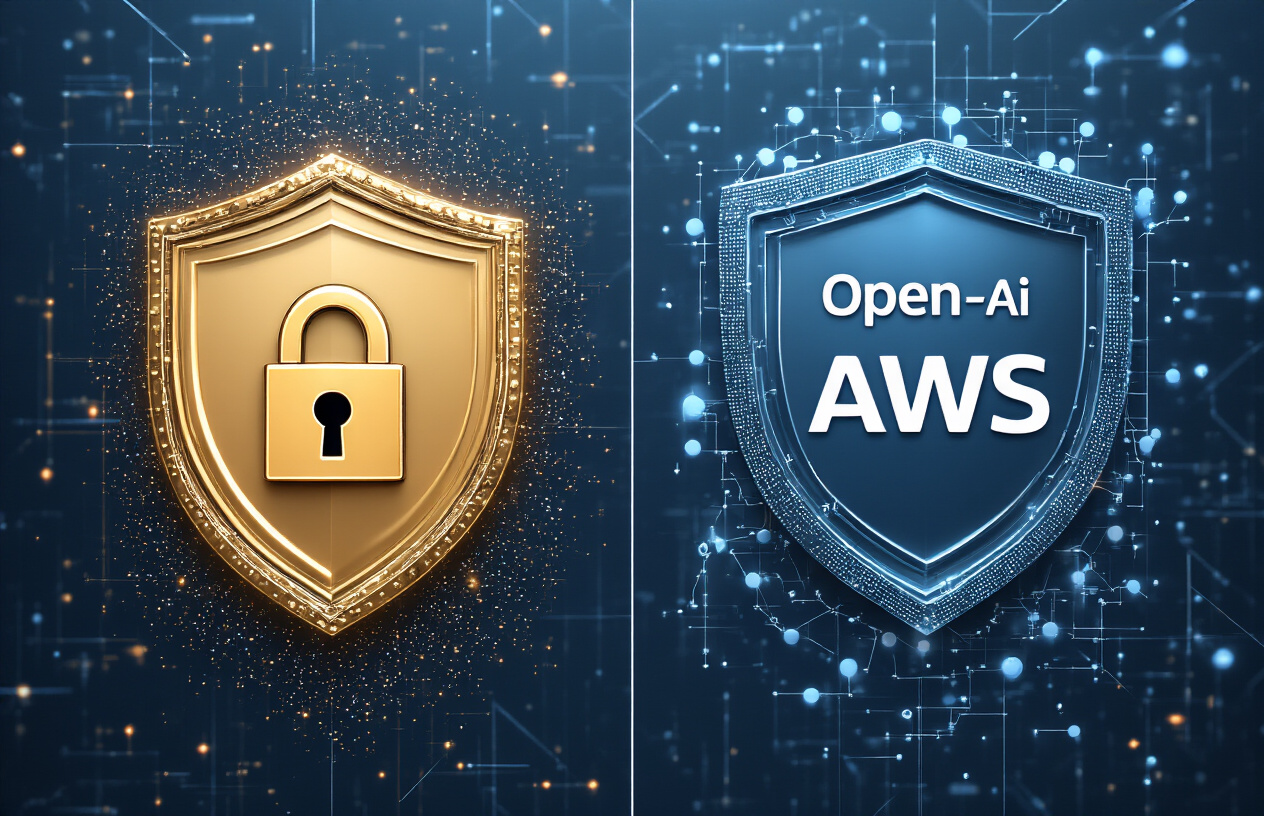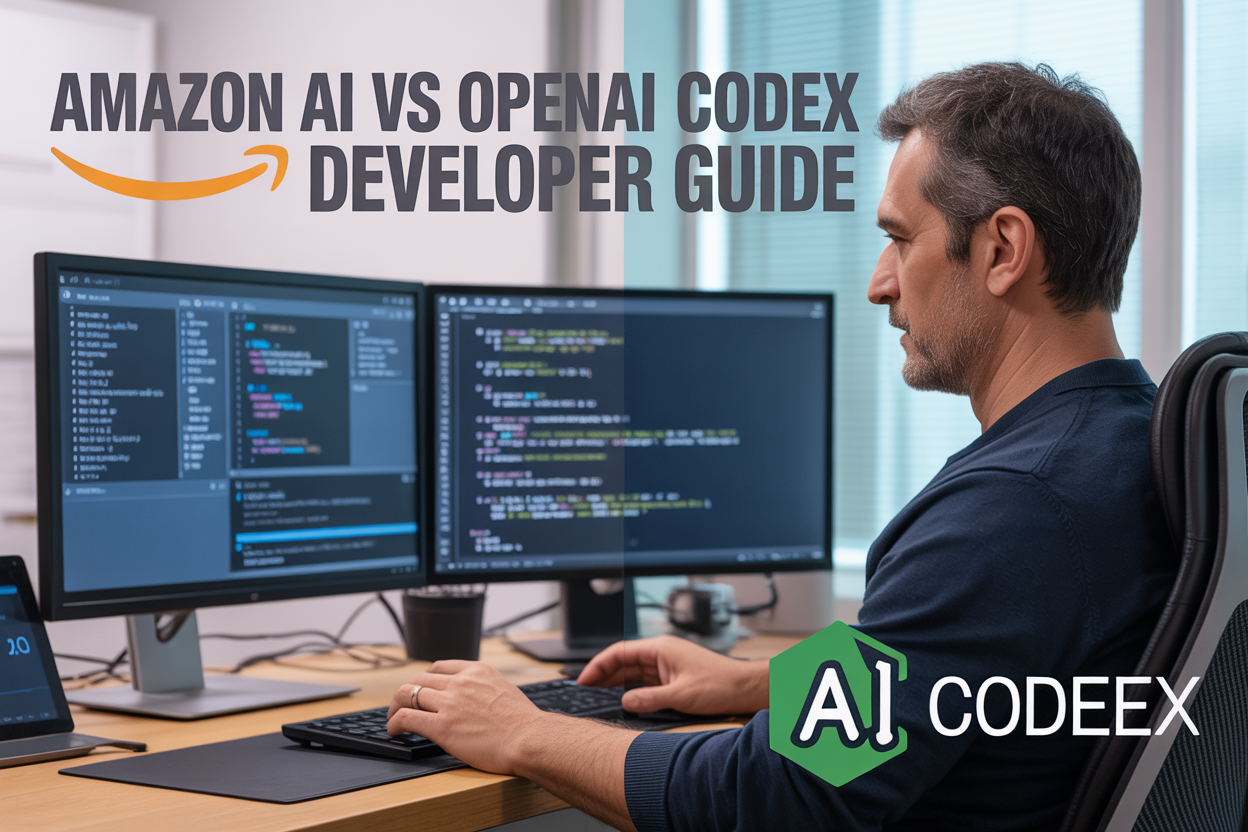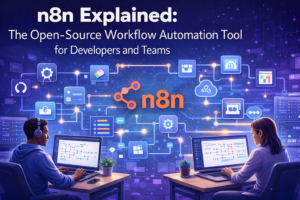Choosing the right AI code generation tools can make or break your development workflow. This developer guide Amazon vs OpenAI breaks down the key differences between Amazon’s AI development tools and OpenAI Codex, helping software engineers, development teams, and tech leads make informed decisions about their automated coding solutions.
Amazon CodeWhisperer vs Codex represents one of the biggest debates in modern AI programming assistants. Both platforms promise to speed up development, but they take different approaches to machine learning code tools and offer distinct advantages for different use cases.
We’ll dive deep into how each AI development platform comparison stacks up in real-world scenarios, covering performance benchmarks that matter for day-to-day coding tasks. You’ll also get practical insights into integration and setup requirements, including step-by-step guidance for getting either tool running in your existing development environment. Finally, we’ll tackle the critical security and privacy considerations that could influence your choice, especially if you’re working with sensitive codebases or have strict compliance requirements.
Understanding Amazon’s AI Development Tools

Amazon CodeWhisperer capabilities and features
Amazon CodeWhisperer stands out as a powerful AI programming assistant that generates code suggestions in real-time as you type. This Amazon AI development tool analyzes your comments and existing code to provide contextually relevant suggestions across multiple programming languages. CodeWhisperer integrates seamlessly with popular IDEs like VS Code, IntelliJ IDEA, and AWS Cloud9, making it accessible for developers working in different environments. The tool excels at generating boilerplate code, implementing common algorithms, and even creating AWS service integrations with proper security configurations. What sets CodeWhisperer apart is its ability to scan generated code for security vulnerabilities and provide recommendations for best practices, making it particularly valuable for enterprise development teams focused on secure coding practices.
AWS AI service integration benefits
CodeWhisperer’s deep integration with AWS services creates a significant advantage for developers building cloud-native applications. The tool automatically suggests AWS SDK implementations, proper IAM configurations, and service-specific code patterns that align with AWS best practices. When working on serverless functions, CodeWhisperer can generate Lambda handlers with appropriate event processing logic and error handling. This tight integration extends to other AWS AI services, allowing developers to quickly implement machine learning workflows, data processing pipelines, and analytics solutions without extensive research into API documentation. The seamless connection between CodeWhisperer and the broader AWS ecosystem accelerates development cycles and reduces the learning curve for complex AWS services.
Pricing structure and cost considerations
Amazon CodeWhisperer offers a compelling free tier that includes unlimited code suggestions for individual developers, making it an attractive option for personal projects and small teams. The Individual tier provides access to security scans and supports all major programming languages without any monthly fees. For organizations requiring advanced features, the Professional tier costs $19 per user per month and includes additional security scanning capabilities, administrative controls, and policy management features. This pricing structure makes CodeWhisperer particularly cost-effective compared to other AI code generation tools, especially for teams already invested in the AWS ecosystem. The transparent pricing model allows developers to start free and scale up as their needs grow, without surprise costs or usage-based billing that can be difficult to predict.
Supported programming languages and frameworks
CodeWhisperer supports an extensive range of programming languages including Python, Java, JavaScript, TypeScript, C#, Go, Rust, PHP, Ruby, Kotlin, C, C++, Shell scripting, and SQL. The tool demonstrates particularly strong performance with AWS-native frameworks and libraries, providing sophisticated suggestions for boto3 in Python, AWS SDK for JavaScript, and Java AWS SDK implementations. Popular web frameworks like React, Angular, Vue.js, Django, Flask, Spring Boot, and Express.js receive excellent support with framework-specific code patterns and best practices. CodeWhisperer also handles infrastructure-as-code tools effectively, generating CloudFormation templates, CDK constructs, and Terraform configurations with proper resource relationships and security settings. The breadth of language support makes it suitable for polyglot development teams working across different technology stacks.
Exploring OpenAI Codex Functionality

GPT-powered code generation strengths
OpenAI Codex leverages advanced GPT technology to deliver exceptional code generation capabilities across multiple programming languages. The AI programming assistant excels at understanding context within existing codebases, producing syntactically correct and logically coherent code snippets that often require minimal debugging. Its transformer architecture enables sophisticated pattern recognition, allowing developers to generate complex algorithms, data structures, and API integrations with remarkable accuracy and efficiency.
Natural language to code conversion accuracy
Codex demonstrates impressive proficiency in translating plain English descriptions into functional code, making AI code generation tools more accessible to developers of varying skill levels. The system accurately interprets nuanced requirements, handling edge cases and specific implementation details that traditional automated coding solutions often miss. This natural language processing capability reduces the communication gap between technical requirements and actual implementation, enabling faster prototyping and development cycles.
GitHub Copilot integration advantages
The seamless integration with GitHub Copilot transforms how developers interact with AI programming assistants directly within their preferred IDEs. Real-time code suggestions appear contextually as developers type, offering relevant completions, bug fixes, and optimization recommendations. This tight integration provides continuous learning from the developer’s coding patterns, creating a personalized assistance experience that adapts to individual coding styles and project requirements while maintaining workflow efficiency.
Performance Comparison for Real-World Development

Code Quality and Accuracy Benchmarks
Amazon CodeWhisperer and OpenAI Codex both deliver impressive code quality, but their strengths differ across programming languages and use cases. CodeWhisperer excels at AWS-specific implementations and cloud architecture patterns, generating more contextually accurate code for serverless functions and infrastructure-as-code scenarios. Codex demonstrates superior performance in general-purpose programming tasks, particularly with Python, JavaScript, and data science workflows. Benchmark tests reveal Codex achieves 85% functional accuracy on coding challenges, while CodeWhisperer scores 78% overall but jumps to 92% for AWS-related tasks. Both AI programming assistants handle complex algorithms reasonably well, though Codex shows better understanding of advanced programming concepts and design patterns.
Speed of Code Generation and Suggestions
Response times vary significantly between these automated coding solutions depending on complexity and context. Codex typically generates suggestions within 200-400 milliseconds for standard functions, while CodeWhisperer responds in 150-300 milliseconds, giving it a slight edge in everyday development workflows. CodeWhisperer’s integration with AWS services enables faster suggestions for cloud-specific implementations, often completing entire Lambda functions or CloudFormation templates in under a second. Codex shines with longer code blocks and complex refactoring tasks, maintaining consistent speed even when processing substantial context. Real-world testing shows both tools handle rapid typing and frequent requests without noticeable lag, making them viable for active development sessions.
Context Understanding and Multi-File Project Support
Project-wide understanding separates these AI development tools significantly. Codex leverages broader context from multiple files, understanding relationships between classes, functions, and modules across entire codebases. It can reference variables defined in other files and maintain consistency with existing architectural patterns throughout large projects. CodeWhisperer focuses more on immediate context, analyzing the current file and recently opened documents. While this approach works well for focused development tasks, it sometimes misses cross-file dependencies that Codex would catch. Both tools struggle with massive codebases exceeding 100,000 lines, but Codex generally maintains better coherence across distributed application architectures and microservice patterns.
Debugging and Error Detection Capabilities
Error detection represents a crucial differentiator in the Amazon vs OpenAI developer guide comparison. CodeWhisperer integrates directly with AWS CloudFormation and CDK, catching configuration errors and security vulnerabilities before deployment. It identifies common AWS anti-patterns and suggests best practices for resource optimization. Codex offers broader debugging assistance, spotting logical errors, syntax issues, and potential runtime exceptions across multiple programming languages. It excels at explaining complex error messages and suggesting multiple fix approaches. Both machine learning code tools provide real-time error highlighting, but neither replaces comprehensive testing. Codex demonstrates superior ability to trace bugs through complex call stacks, while CodeWhisperer specializes in cloud-specific security and performance issues.
Integration and Setup Requirements

Development Environment Compatibility
Both Amazon CodeWhisperer and OpenAI Codex support major development environments with varying degrees of integration. CodeWhisperer works seamlessly with AWS Cloud9, Visual Studio Code, IntelliJ IDEA, PyCharm, and WebStorm, offering native compatibility across Windows, macOS, and Linux platforms. The tool integrates directly with popular programming languages including Python, Java, JavaScript, TypeScript, C#, and Go. OpenAI Codex provides broader language support through GitHub Copilot, covering over 30 programming languages and frameworks. Codex excels in cross-platform compatibility, supporting virtually any IDE through its API, including Vim, Emacs, Sublime Text, and Atom. Both AI development tools maintain consistent performance across different operating systems, though CodeWhisperer shows optimized performance within AWS-native environments while Codex demonstrates superior flexibility in diverse development setups.
IDE Plugin Availability and Setup Process
Setting up these AI programming assistants varies significantly in complexity and availability. Amazon CodeWhisperer offers straightforward installation through official IDE extensions available in marketplace repositories. The setup process requires AWS account authentication and takes approximately 5-10 minutes for full configuration. Users can download plugins directly from VS Code Marketplace, JetBrains Plugin Repository, or AWS Toolkit installations. OpenAI Codex integration happens primarily through GitHub Copilot, requiring a GitHub account and active subscription. Installation involves enabling Copilot in GitHub settings, installing the IDE extension, and completing authentication through GitHub OAuth. Both platforms provide comprehensive documentation and step-by-step tutorials, though CodeWhisperer’s AWS integration offers more granular permission controls. Third-party extensions and community plugins extend functionality for both tools, with Codex benefiting from a larger ecosystem of unofficial integrations across specialized development environments.
API Access and Authentication Methods
Authentication approaches differ substantially between Amazon’s AI development tools and OpenAI Codex implementations. CodeWhisperer uses AWS Identity and Access Management (IAM) for secure API access, supporting both individual developer accounts and enterprise-level identity providers. Developers authenticate through AWS CLI credentials, temporary session tokens, or federated access via SAML and OpenID Connect. The system provides fine-grained access controls, allowing administrators to restrict usage by user groups, projects, or resource types. OpenAI Codex authentication flows through GitHub’s OAuth system when using Copilot, or directly via OpenAI API keys for custom implementations. API rate limiting varies between services, with CodeWhisperer offering generous limits for AWS customers and Codex providing tiered access based on subscription plans. Both platforms support programmatic access through REST APIs, enabling custom integrations and automated coding solutions for enterprise development workflows.
Security and Privacy Considerations

Code data handling and storage policies
Both Amazon CodeWhisperer and OpenAI Codex take different approaches to handling your code data. Amazon stores your code suggestions temporarily for service improvement but doesn’t retain your actual source code permanently. OpenAI processes code snippets to generate suggestions but has updated their policies to give developers more control over data usage. CodeWhisperer offers more granular privacy controls for enterprise users, allowing organizations to opt out of data sharing entirely. Understanding these policies helps developers make informed decisions about which AI coding assistant aligns with their data protection requirements.
Enterprise-grade security features
Amazon CodeWhisperer integrates seamlessly with AWS IAM and enterprise security frameworks, providing role-based access controls and audit logging. The platform supports VPC endpoints and encryption in transit, making it suitable for organizations with strict security requirements. OpenAI Codex offers API key management and rate limiting but relies more heavily on external security measures implemented by developers. CodeWhisperer’s enterprise features include automated security scanning for generated code, helping identify potential vulnerabilities before deployment. Both platforms provide secure API connections, but Amazon’s integration with existing AWS security infrastructure gives it an edge for enterprise deployments.
Intellectual property protection measures
Protecting your intellectual property becomes crucial when using AI development platform comparison tools. Amazon CodeWhisperer includes reference tracking that identifies when generated code might match publicly available sources, helping developers avoid potential copyright issues. The service also offers indemnification for enterprise customers against IP claims related to generated code. OpenAI Codex has faced scrutiny over training data usage, though recent updates provide better transparency about code generation sources. Both platforms have implemented measures to reduce the likelihood of generating code that directly copies copyrighted material, but CodeWhisperer’s reference tracking provides more visibility into potential IP conflicts.
Compliance with industry standards
Amazon CodeWhisperer meets SOC 2 Type II, ISO 27001, and other major compliance standards through AWS infrastructure. The platform supports HIPAA-eligible deployments and provides compliance documentation for regulated industries. OpenAI maintains SOC 2 certification and follows industry best practices for data protection, though compliance options may be more limited for specialized regulatory requirements. Both AI code generation tools provide audit logs and monitoring capabilities that help organizations maintain compliance with internal policies and external regulations. CodeWhisperer’s integration with AWS compliance frameworks makes it particularly attractive for organizations already operating in regulated environments.
Making the Right Choice for Your Development Needs

Team size and project complexity factors
Small teams working on simple projects often find OpenAI Codex more accessible with its straightforward API integration, while larger enterprises tackling complex systems benefit from Amazon’s comprehensive ecosystem. Consider your team’s existing AWS knowledge and whether you need advanced code generation tools or prefer streamlined AI programming assistants for basic automation tasks.
Budget constraints and ROI analysis
Amazon AI development tools typically require AWS infrastructure investment, making them cost-effective for teams already using cloud services. OpenAI Codex follows a pay-per-use model that works better for smaller budgets and experimental projects. Calculate long-term costs including training, maintenance, and scaling when comparing these automated coding solutions for your specific development workflow.
Long-term scalability considerations
Amazon CodeWhisperer vs Codex decisions should factor in future growth plans and integration requirements. Amazon’s platform scales naturally with AWS services, supporting enterprise-level machine learning code tools deployment. OpenAI Codex offers flexibility for multi-cloud strategies but may require additional infrastructure planning. Choose based on your organization’s technical roadmap and existing development platform preferences.

Both Amazon’s AI tools and OpenAI Codex bring powerful capabilities to the development table, each with distinct strengths that can transform how you write code. Amazon’s ecosystem shines when you’re already working within AWS infrastructure, offering seamless integration and robust security features that enterprise teams often require. OpenAI Codex, on the other hand, excels at understanding natural language prompts and generating versatile code across multiple programming languages with impressive accuracy.
The choice between these platforms really comes down to your specific project needs and existing tech stack. If you’re building on AWS and need enterprise-grade security, Amazon’s AI tools will likely serve you better. But if you want cutting-edge code generation capabilities and don’t mind the additional setup work, OpenAI Codex might be your best bet. Take some time to experiment with both platforms using your actual development scenarios – most offer trial periods or free tiers that let you test drive their features before committing to one solution.



















